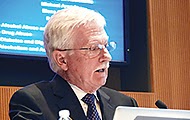Brain Stress Systems May Be Key Piece of the Addiction Puzzle
 |
Excessive use of drugs triggers negative emotional states that activate the stress systems within areas of the brain known to mediate emotions, including the amygdala and basal ganglia, said Koob, who will become director of the National Institute on Alcohol Abuse and Alcoholism in January.
Two neurotransmitters—corticotropin-releasing factor (CRF) in the amygdala and the dynorphin-κ opioid system in the basal ganglia—are in those brain areas and mediate anxiety-like behavior, fear conditioning, and dysphoria-like behavior in animal models, Koob noted. He hypothesized that brain stress response systems are activated by excessive drug intake, then activated again during repeated withdrawals, and continue during abstinence.
“A role of the brain stress systems in addiction not only provides insight into the neurobiology of the emotional misery of addiction but also provides novel targets for the treatment of addiction,” he concluded.
For more in Psychiatric News about George Koob's research on addiction, see " People With Addiction Exhaust Brain’s Limited Reward System."
(Image: Aaron Levin/Psychiatric News)



-Jun-24-2025-05-39-16-3390-PM.jpg?height=200&name=Petros%20Levounis%20OFFICIAL%20600%20(1)-Jun-24-2025-05-39-16-3390-PM.jpg)

